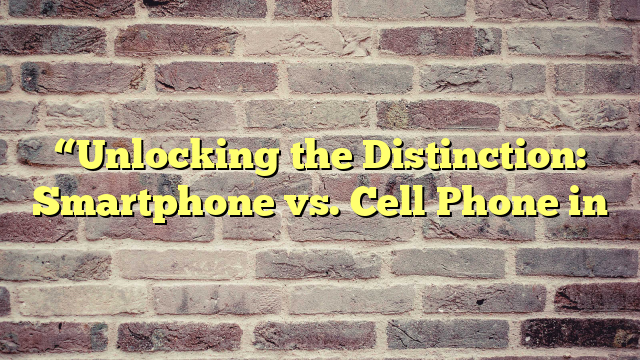Introduction:
In today’s fast-paced world, mobile devices have become an essential part of our daily lives. From communication to entertainment, these devices have revolutionized the way we live and work. However, with the advancement of technology, the terms “smartphone” and “cell phone” are often used interchangeably, leading to confusion among users. While both devices serve the purpose of communication, there are distinct differences between them. In this article, we will explore the differences between a smartphone and a cell phone, and how they have evolved over the years.
Subheading 1: Evolution of Mobile Phones
The first mobile phone was introduced in 1973 by Motorola, which weighed around 2 pounds and had a battery life of only 30 minutes. Since then, mobile phones have come a long way in terms of design, features, and functionality. The introduction of smartphones in the early 2000s changed the game entirely. These devices were equipped with advanced features such as internet connectivity, touchscreens, and app stores, making them more than just a communication device. On the other hand, cell phones have remained relatively unchanged, with their primary function being making and receiving calls and text messages.
Subheading 2: Features and Functionality
Smartphones are essentially mini-computers that can perform various tasks, from browsing the internet to streaming videos and playing games. They come with advanced features like high-quality cameras, biometric sensors, and virtual assistants, making them highly versatile. On the contrary, cell phones have limited features and are primarily used for making calls and sending messages. They lack the advanced features and functionality of smartphones, but they are still preferred by some users for their simplicity and ease of use.
Subheading 3: Operating Systems
One of the significant differences between smartphones and cell phones is the operating system they use. Smartphones run on operating systems like iOS, Android, and Windows, which are more advanced and offer a user-friendly interface. These operating systems allow users to download apps, customize their devices, and perform various tasks. On the other hand, cell phones use a simple operating system that does not support app downloads or extensive customization.
Subheading 4: Internet Connectivity
Smartphones are designed to connect to the internet, whether through Wi-Fi or cellular data. This allows users to stay connected and access various online services, such as social media, emails, and online shopping. On the other hand, cell phones do not have internet connectivity, and users need to rely on Wi-Fi hotspots or a separate device to access the internet.
Subheading 5: Cost
The cost of smartphones and cell phones varies significantly. Smartphones are generally more expensive, with prices ranging from a few hundred to a few thousand dollars, depending on the brand and features. On the other hand, cell phones are relatively affordable and can be purchased for as low as $20. This makes them a popular choice for people on a budget or those who do not require advanced features.
Subheading 6: Battery Life
Smartphones are known for their short battery life, mainly due to the advanced features and apps that drain power. On average, a smartphone needs to be charged at least once a day, depending on usage. On the other hand, cell phones have a longer battery life and can last up to a week on a single charge. This makes them a more reliable option for users who are always on the go or do not have access to charging facilities.
Subheading 7: Security
With the increase in cyber threats and hacking attempts, security has become a significant concern for mobile device users. Smartphones come with advanced security features such as biometric sensors and encryption, making it difficult for unauthorized access. On the other hand, cell phones do not have such security features and are more vulnerable to security breaches.
Conclusion:
In conclusion, while smartphones and cell phones serve the purpose of communication, they are distinct devices with different features and functionality. Smartphones are more advanced and offer a wide range of features, while cell phones are simple and affordable. Both devices have their advantages and disadvantages, and the choice between them depends on the user’s needs and preferences. As technology continues to evolve, we can expect to see more differences between these devices in the future.

